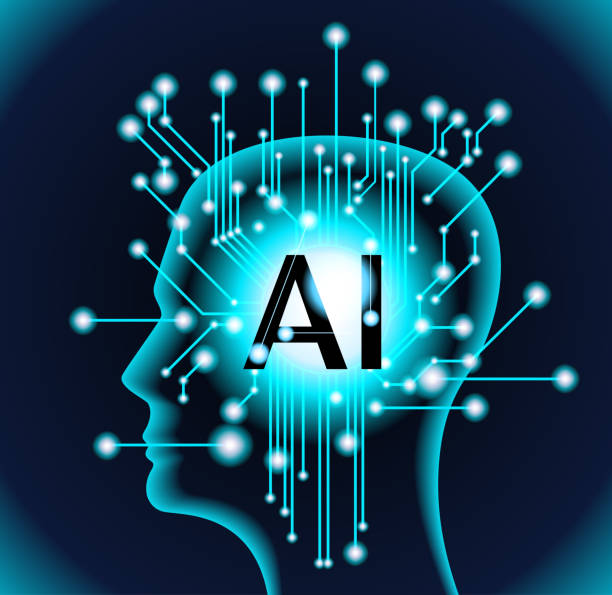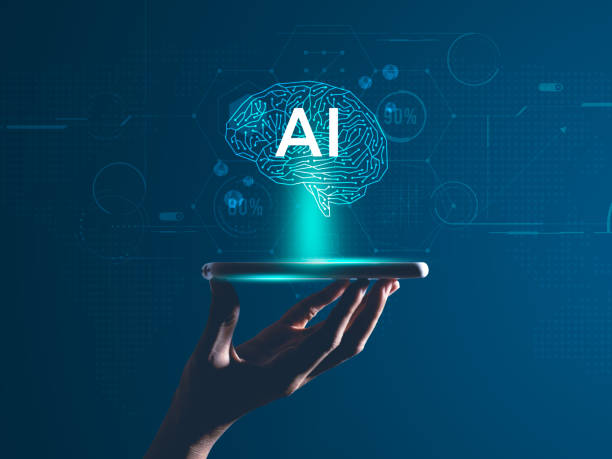What is Artificial Intelligence and What are its Applications?

Artificial intelligence (AI) is a branch of computer science that focuses on building machines capable of performing tasks that typically require human intelligence.
This includes learning, problem-solving, pattern recognition, language understanding, and reasoning.
#Artificial_Intelligence is applied across a wide range of industries, including:
- Medicine: Disease diagnosis, drug development
- Finance: Fraud detection, algorithmic trading
- Transportation: Self-driving cars
- Manufacturing: Automation, quality control
- Marketing: Ad targeting, sentiment analysis
In fact, AI has already permeated our daily lives.
From voice assistants like Google Assistant and Siri to movie recommendation systems on Netflix, AI is constantly learning and improving.
Machine learning is a subset of artificial intelligence that allows systems to learn from data without being explicitly programmed.
Machine learning algorithms can identify patterns in data and make predictions or decisions based on them.
Is your current e-commerce website design causing you to lose customers and sales?
Rasaweb is your solution with modern, user-friendly e-commerce website designs!
✅ Significant increase in conversion rates and sales
✅ Strong branding and building customer trust
⚡ Get a free e-commerce website design consultation from Rasaweb!
Types of Artificial Intelligence: Approaches and Techniques

Artificial intelligence can be classified based on different capabilities and approaches.
In terms of capability, AI is divided into two main categories:
- Narrow AI (Weak AI): This type of AI is designed to perform a specific task.
Most existing AI systems currently fall into this category. - General AI (Strong AI): This type of AI possesses the ability to understand, learn, and apply knowledge across a wide range of tasks, just like a human.
Strong AI is still under development.
In terms of approaches and techniques, AI includes:
- Machine Learning: As mentioned earlier, it allows systems to learn from data.
- Deep Learning: A subset of machine learning that uses artificial neural networks with multiple layers to analyze data.
- Natural Language Processing (NLP): Enables computers to understand and generate human language.
- Computer Vision: Enables computers to understand and interpret images.
- Expert Systems: Programs that attempt to simulate the decision-making abilities of a human expert.
Machine Learning and its Algorithm Types

Machine Learning is one of the most important branches of artificial intelligence and enables systems to learn from data without explicit programming.
Machine learning algorithms allow systems to identify patterns in data and make predictions or decisions based on them.
The main types of machine learning algorithms include:
- Supervised Learning: In this type of learning, the algorithm is trained using labeled data.
This means each input data point has a specified output that the algorithm needs to learn.
Example: Classifying emails as spam or non-spam. - Unsupervised Learning: In this type of learning, the algorithm is trained using unlabeled data and must automatically find patterns in the data.
Example: Clustering customers based on purchasing behavior. - Reinforcement Learning: In this type of learning, an agent is placed in an environment and learns how to perform best by taking various actions and receiving rewards or penalties.
Example: Training a robot to play chess.
Examples of Machine Learning Algorithms
- Linear Regression: For predicting a continuous value.
- Decision Tree: For classifying data.
- Support Vector Machine (SVM): For classification and regression.
- Neural Networks: For a wide range of tasks, including image recognition and natural language processing.
| Algorithm | Learning Type | Application |
|---|---|---|
| Linear Regression | Supervised | House price prediction |
| Decision Tree | Supervised | Disease diagnosis |
| K-means Clustering | Unsupervised | Customer segmentation |
Deep Neural Networks and Their Applications

Deep Neural Networks (DNNs) are one of the most powerful machine learning techniques, inspired by the structure of the human brain.
These networks consist of multiple layers of interconnected nodes (neurons), with each layer responsible for extracting specific features from the data.
DNNs perform exceptionally well in tasks such as image recognition, natural language processing, and speech recognition.
Artificial intelligence is striving to grow in all fields.
Applications of Deep Neural Networks
- Image Recognition: DNNs have been highly successful in recognizing objects, faces, and patterns in images.
This technology is used in applications such as surveillance systems, self-driving cars, and medical diagnosis. - Natural Language Processing (NLP): DNNs have made significant advancements in understanding and generating human language.
This technology is used in machine translation, question answering, and sentiment analysis. - Speech Recognition: DNNs perform with high accuracy in converting speech to text.
This technology is used in voice assistants, dictation, and automatic subtitling. - Game Playing: DNNs have surpassed the best human players in games like chess and Go.
This technology is used in the development of game AI and gaming robots.
Due to their ability to learn complex features from data, deep neural networks are increasingly being used across a wide range of industries.
Artificial intelligence is striving for continuous advancement.
Does your current website convert visitors into customers, or does it drive them away? Solve this problem permanently with professional corporate website design by Rasaweb!
✅ Building credibility and powerful branding
✅ Attracting target customers and increasing sales
⚡ Get a free consultation right now!
Natural Language Processing (NLP) and its Applications in Artificial Intelligence

Natural Language Processing (NLP) is a branch of artificial intelligence that enables computers to understand, interpret, and generate human language.
NLP encompasses a wide range of tasks, including syntactic analysis, semantic analysis, language generation, and reading comprehension.
Artificial intelligence plays a very important role.
Applications of Natural Language Processing
- Machine Translation: NLP is used in automatic text translation from one language to another.
- Question Answering: NLP is used in automatically answering questions posed in natural language.
- Sentiment Analysis: NLP is used in determining the sentiment (positive, negative, neutral) expressed in text.
- Chatbots: NLP is used in building chatbots that can interact with humans in natural language.
- Text Summarization: NLP is used in generating automatic summaries of long texts.
NLP is currently used in many applications, including voice assistants like Siri and Alexa, search engines like Google and Bing, and customer support systems.
Artificial intelligence and its functions and features are developing daily.
Computer Vision and its Applications

Computer Vision is another important branch of artificial intelligence that enables computers to understand and interpret images.
Computer Vision encompasses a wide range of tasks, including object detection, face recognition, pattern recognition, and 3D reconstruction.
Applications of Computer Vision
- Self-Driving Cars: Computer vision is used to detect lane lines, traffic signs, and other vehicles in self-driving cars.
- Surveillance Systems: Computer vision is used to detect unusual activities and identify individuals in surveillance systems.
- Medical Diagnosis: Computer vision is used to diagnose diseases by analyzing medical images such as X-rays and MRIs.
- Robotics: Computer vision enables robots to understand their surroundings and perform various tasks.
- Quality Control: Computer vision is used to detect defects in products on production lines.
Computer vision is currently used in many applications, including smartphones, security cameras, and industrial automation systems.
Artificial intelligence is a vast field.
Challenges and Limitations of Artificial Intelligence

Despite significant advancements in the field of artificial intelligence, there are still important challenges and limitations that need to be addressed.
These challenges include:
- Need for Large Amounts of Data: Many AI algorithms, especially deep learning algorithms, require a large volume of data for training.
- Interpretability: Understanding why an AI model has made a specific decision can be difficult.
This can reduce trust in the model and limit its use in certain applications. - Bias: If the training data of an AI model contains bias, the model will also be biased.
This can lead to unfair or discriminatory decisions. - Security: AI models can be vulnerable to cyberattacks.
- Ethical Issues: The use of artificial intelligence can raise significant ethical issues, such as privacy, accountability, and impacts on the job market.
Table of Examples Related to Challenges and Limitations of Artificial Intelligence
| Challenge | Description | Potential Solutions |
|---|---|---|
| Need for large data | Deep learning algorithms require a high volume of data. | Using synthetic data generation techniques, transfer learning. |
| Interpretability | Understanding AI model decisions is difficult. | Using more interpretable models, model explanation techniques. |
| Bias | Bias in training data can lead to bias in the model. | Using more diverse data, bias mitigation techniques. |
The Future of Artificial Intelligence and its Impact on Societies

Artificial intelligence is rapidly advancing and is expected to have a profound impact on societies in the near future.
Some of the potential impacts of artificial intelligence include:
- Automation: AI can automate many jobs, which can lead to increased productivity and reduced costs, but it can also result in job losses.
- Improved Healthcare: AI can assist in diagnosing diseases, developing drugs, and providing more personalized care.
- Enhanced Education: AI can help in delivering more personalized education and creating more engaging learning environments.
- Better Transportation: AI can aid in the development of self-driving cars and improve the safety and efficiency of transportation systems.
- Solving Global Problems: AI can contribute to solving global problems such as climate change, hunger, and poverty.
However, it is important to remember that artificial intelligence is a tool, and like any other tool, it can be used for good or bad purposes.
Therefore, it is crucial to use artificial intelligence responsibly and ethically.
Artificial intelligence can be very beneficial.
Tired of losing business opportunities due to lacking a professional corporate website? Worry no more! With Rasaweb’s corporate website design services:
✅ Your brand’s credibility and professionalism will increase.
✅ You will attract more target customers and sales leads.
⚡ Get a free consultation right now to get started!
Steps to Learn and Enter the World of Artificial Intelligence

Entering the world of artificial intelligence can be an exciting and rewarding experience.
Here’s a step-by-step guide to getting started:
- Learn the Fundamentals: Start by learning the basic concepts of artificial intelligence, machine learning, and deep learning.
There are many online resources available for learning these concepts, including online courses, tutorials, and books. - Learn Programming: To work with AI, you need to learn a programming language.
Python is one of the most popular languages for AI. - Learn AI Libraries: After learning programming, you should familiarize yourself with AI libraries.
Libraries like TensorFlow, PyTorch, and scikit-learn provide powerful tools for building and training AI models. - Work on Projects: The best way to learn AI is by working on practical projects.
Start with small projects and gradually move to larger and more complex ones. - Join AI Communities: Joining AI communities can help you connect with other AI enthusiasts, learn from their experiences, and share your projects.
With effort and perseverance, you can become an AI expert and find a career in this thriving and growing field.Artificial intelligence is a very fascinating science.
Useful Resources and Tools for Learning Artificial Intelligence

There are many useful resources and tools for learning artificial intelligence.
Some of these resources include:
- Online Courses: Online learning platforms such as Coursera, edX, and Udacity offer numerous courses in the field of artificial intelligence.
- Tutorials: Many websites and blogs provide free tutorials on artificial intelligence.
- Books: There are many books on artificial intelligence that you can use to learn basic and advanced concepts.
- AI Libraries: Libraries like TensorFlow, PyTorch, and scikit-learn provide powerful tools for building and training AI models.
- AI Communities: Joining AI communities can help you connect with other AI enthusiasts, learn from their experiences, and share your projects.
Also, there are many tools available for working with artificial intelligence, including:
- Google Colab: A free online environment for running Python code and working with AI libraries.
- Kaggle: An online platform for participating in machine learning competitions and sharing data and code.
- Anaconda: A platform for managing Python packages and environments.
By using these resources and tools, you can easily start learning artificial intelligence and progress in this field.
Frequently Asked Questions
| Question | Answer |
|---|---|
| What is Artificial Intelligence? | It is the simulation of human intelligence in machines programmed to think like humans and imitate their actions. |
| What are the main branches of Artificial Intelligence? | They include machine learning, deep learning, natural language processing, computer vision, and robotics. |
| What is Machine Learning? | It is a branch of Artificial Intelligence that focuses on enabling systems to learn from data and identify patterns without explicit programming. |
| Mention examples of Artificial Intelligence applications in our daily lives. | Voice assistants (like Siri and Alexa), recommendation systems in Netflix and Amazon, self-driving cars, and facial recognition programs. |
| What is Deep Learning? | It is a subset of machine learning that uses multi-layered artificial neural networks (deep) to process large amounts of data. |
| What is Natural Language Processing (NLP)? | It is a branch of Artificial Intelligence that focuses on enabling computers to understand, interpret, and generate human language. |
| What are some ethical concerns related to Artificial Intelligence? | They include data bias, privacy, job loss, and accountability in case of errors. |
| What are the main benefits of Artificial Intelligence? | Increased efficiency, improved decision-making, automation of repetitive tasks, and discovery of complex patterns in data. |
| How is Artificial Intelligence used in healthcare? | In disease diagnosis, drug discovery, analysis of medical images, and personalized patient care. |
| How do you see the future of Artificial Intelligence? | It is expected to continue evolving rapidly, impacting all aspects of human life, from industry to education and entertainment. |
And other advertising services from Rasaweb Advertising Agency:
- Smart Custom Software: A combination of creativity and technology to improve SEO ranking through SEO-driven content strategy.
- Smart Direct Marketing: A professional solution for improving SEO ranking with a focus on attractive UI design.
- Smart Website Development: A blend of creativity and technology for user interaction through SEO-driven content strategy.
- Smart Advertising Campaign: A fast and efficient solution for customer behavior analysis with a focus on marketing automation.
- Smart Digital Advertising: A novel service for increasing click-through rates by optimizing key pages.
And over hundreds of other services in the field of internet advertising, advertising consultation, and organizational solutions.
Internet Advertising | Advertising Strategy | Advertorials
Resources
What is Artificial Intelligence? Complete Introduction and Applications
The Future of Artificial Intelligence: Opportunities and Challenges
Beginner’s Guide to Learning Artificial Intelligence
Ethics in Artificial Intelligence and its Impact on Society
? Are you ready to transform your business in the digital world? Rasaweb Afarin Digital Marketing Agency, specializing in SEO, content marketing, and corporate website design, is your comprehensive solution for online success. Contact us today for a free consultation.
📍 Tehran, Mirdamad Street, next to the Central Bank, Kazeroun Jonoubi Alley, Ramin Alley, No. 6


